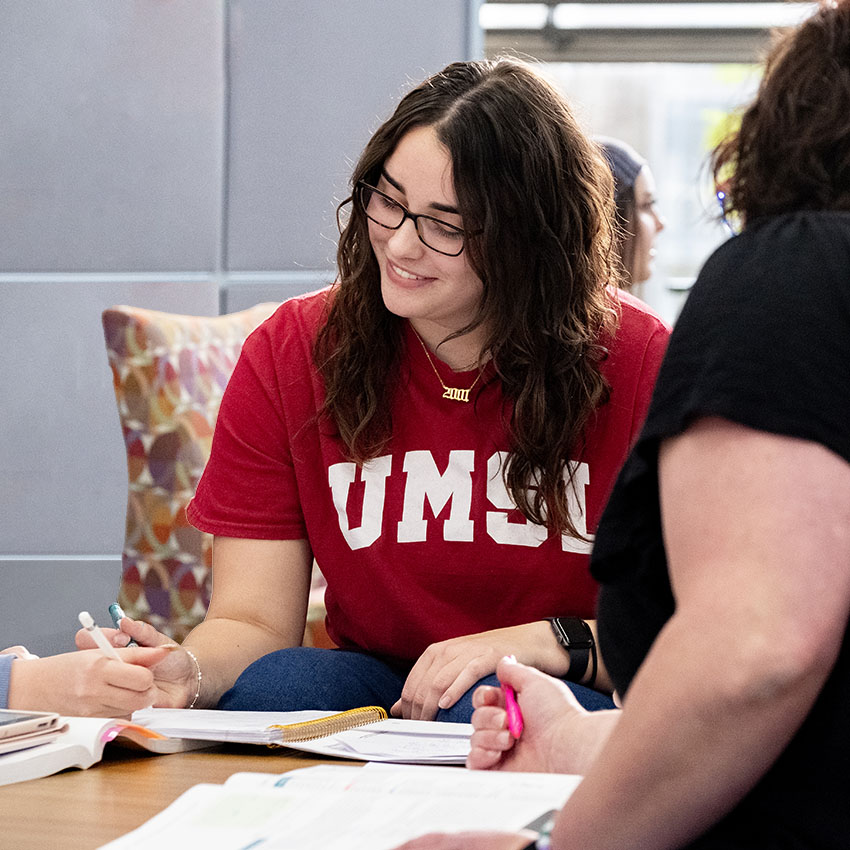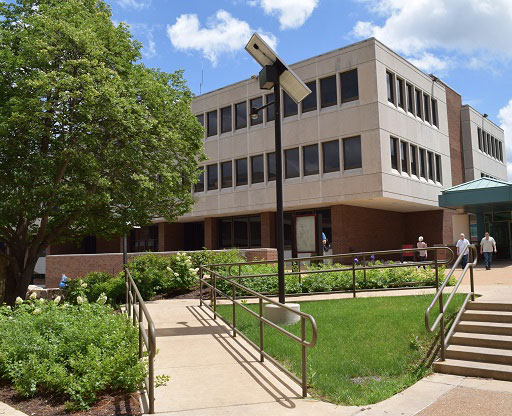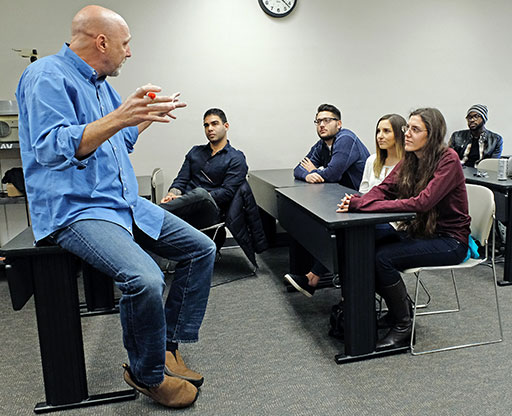Find a major with UMSL’s exploratory studies pathways
Choosing a major is a big decision, but the University of Missouri–St. Louis makes it easy with our Exploratory Pathways. Whether you’re curious about business, fascinated by technology or driven to make a social impact, exploratory studies offer a structured yet flexible way to find a major while staying on track for graduation.
When you apply to UMSL as an undeclared major, you’ll select the Exploratory Pathway that best aligns with your interests. Each pathway is associated with several degree options, providing a solid foundation before you choose a major. During your exploratory courses, you’ll identify what excites and motivates you most while earning credit toward your degree.
Choose from exploratory studies in:
- Creativity and Design
- Education and Social Change
- The Human Experience
- The Interconnected World
- Mathematics and Scientific Research
- Technology and Innovation
Program type:
Exploratory
Format:
On-Campus
Take the next step
Request more information below:

Why choose exploratory studies at UMSL?
Our Exploratory Pathways offer several benefits for undeclared majors, including:
- Comprehensive academics: With our exploratory studies pathways, you’ll have two years (four semesters) to explore courses in diverse subject areas before choosing a degree. Credits earned in your exploratory courses can be applied toward your major, keeping you on track for graduation.
- Help finding a major: As an undeclared major, you’ll find a supportive learning environment to help you find a major you’re passionate about. As you explore courses, our dedicated advisors and faculty will guide you toward a program that ignites your passion.
- The full campus experience: Exploratory studies students enjoy the same benefits as other UMSL majors, including academic and career advising, student organizations and more. You’ll have access to campus resources, events and a vibrant community that supports your academic and personal growth.
Exploratory studies: Choose your path.
For undeclared students, finding a major starts with choosing the right Exploratory Pathway. Explore the options below to learn more about UMSL’s Exploratory Pathways and associated majors.
Majors: Business, Communication, Economics, International Relations, Political Science and Public Policy Administration
The Business and Geopolitics Pathway is intended for students that are intrigued by markets, trade, and political issues. Students pursuing this route may have interests in domestic and international economic developments, the role that corporations and politics play in global issues, and how nonprofit agencies help bring assistance to those in need. Students can expect to learn how the world operates as a function of commerce and political affairs.
Year One:
| Fall Semester (16 credit hours) | |
| COMM 1030: Interpersonal Communication | (3) |
| ENGL 1100: First-Year Writing | (3) |
| INF SYS 1800: Introduction to Information Systems | (3) |
| MATH 1030: College Algebra | (3) |
| POL SCI 1100: Introduction to American Politics | (3) |
| INTDSC 1003: University Studies | (1) |
| Spring Semester (15 credit hours) | |
| COMM 2231: Communication in the Organization | (3) |
| ECON 1001: Principles of Microeconomics | (3) |
| MATH 1105: Basic Probability and Statistics | (3) |
| POL SCI 1500: Introduction to Comparative Politics | (3) |
| GEN ED EXPLORE: Humanities and Fine Arts | (3) |
Year Two
| Fall Semester (15 credit hours) | |
| ACCTNG 2400: Fundamentals of Financial Accounting | (3) |
| BUS AD 2900: Legal Environment of Business | (3) |
| ECON 1002: Introduction to Macroeconomics | (3) |
| MATH 1100: Basic Calculus | (3) |
| POL SCI 1800: Introduction to International Politics | (3) |
| Spring Semester (15 credit hours) | |
| ACCTNG 2410: Managerial Accounting | (3) |
| POL SCI 3000: Political Analysis | (3) |
| SCMA 3300: Business Analytics and Statistics | (3) |
| GEN ED EXPLORE: Humanities and Fine Arts | (3) |
| GEN ED EXPLORE: Math and Life/Natural Sciences | (3) |
This is a sample two-year plan of the courses to take each academic semester/session. This map is not a substitute for academic advisement.
Majors: Communication, Entrepreneurship and Studio Art
The Creativity and Design Pathway is intended for students with artistic and innovative perspectives. Students considering this route tend to be self-starters who revel in the notion that they can devise their own path towards a meaningful career in any number of occupations. People pursuing these types of majors should have a strong sense of self-confidence and the ability to translate what they are learning to the world of work after graduation.
Year One:
| Fall Semester (16 credit hours) | |
| COMM 1030: Interpersonal Communication or ENT 1100: Introduction to Entrepreneurship |
(3) |
| COMM 1050: Introduction to Mass Communication | (3) |
| ENGL 1100: First-Year Writing | (3) |
| ST ART 1140: Drawing I or 2205: Graphic Design I* | (3) |
| ST ART 1150: 2D Design: Surface or 2220: Computer Design I * | (3) |
| INTDSC 1003: University Studies | (1) |
| Spring Semester (15 credit hours) | |
| ART HS 1120: Global Art and Visual Culture | (3) |
| COMM 2235: Professional Communication or ENT 3103: Social Entrepreneurship |
(3) |
| MATH 1020: Contemporary Math or 1030: College Algebra | (3) |
| ST ART 1020: Expanded Artforms or 3305: Graphic Design II* | (3) |
| ST ART 1151: 3D Design: Space or 2221: Computer Design II* | (3) |
Year Two
| Fall Semester (15 credit hours) | |
| COMM 2231: Communication in the Organization | (3) |
| ECON 1001: Principles of Microeconomics | (3) |
| ST ART 2245: Painting I | (3) |
| ST ART 2260: Photography I or 3310: Graphic Design III* | (3) |
| GEN ED EXPLORE: Math and Life/Natural Sciences | (3) |
| Spring Semester (15 credit hours) | |
| BUS AD 2900: Legal Environment of Business | (3) |
| ECON 1002: Principles of Macroeconomics | (3) |
| ST ART 2210: Typography* or 2230: Drawing II | (3) |
| ST ART 3311: Graphic Design IV* | (3) |
| GEN ED EXPLORE: Math and Life/Natural Sciences | (3) |
*for students interested in graphic design
This is a sample two-year plan of the courses to take each academic semester/session. This map is not a substitute for academic advisement.
Majors: Criminology and Criminal Justice, Education, Psychological Sciences, Social Work and Sociology
The Education and Social Change Pathway is intended for students that are motivated to help improve society at the grassroots level. Students in this Pathway are considering becoming educators (both in and out of the classroom) with an intent of uncovering social issues and assisting those in need. Students that choose this path are particularly intrigued by working with people to make progress in their communities as an agent of change and hope.
Year One:
| Fall Semester (16 credit hours) | |
| BIOL 1012: General Biology | (3) |
| ENGL 1100: First-Year Writing | (3) |
| HIST 1001: American History Before 1865 | (3) |
| MATH 1030: College Algebra | (3) |
| PSYCH 1003: General Psychology | (3) |
| INTDSC 1003: University Studies or TCH ED 1000: Building Community, Culture, and Learning* |
(1) |
| Spring Semester (15 credit hours) | |
| COMM 1040: Introduction to Public Speaking or EDUC 2222: Interpretation: Connecting Audiences and Meaning* |
(3) |
| ED PSYCH 2212: Child and Adolescent Development | (3) |
| GEOL 1001: General Geology | (3) |
| SOC 1010: Introduction to Sociology | (3) |
| TCH ED 1001: Early Clinical Experience: Community Agency* | (1) |
| GEN ED EXPLORE: Humanities and Fine Arts | (3) |
Year Two
| Fall Semester (15 credit hours) | |
| CRIMIN 1100: Intro to Criminology and Criminal Justice | (3) |
| ED TECH 2230: Information Literacy* | (3) |
| PSYCH/SOC 2250: Social Psychological Sciences | (3) |
| SOC WK 2000: Social Work and Social Issues | (3) |
| SOC WK 2200: Social Welfare as a Social Institution | (3) |
| TCH ED 2000: Becoming a Professional Educator* | (1) |
| Spring Semester (15 credit hours) | |
| GEOG 1001: Introduction to Geography | (3) |
| POL SCI 1100: Introduction to American Politics | (3) |
| PSYCH 2245: Abnormal Psychology | (3) |
| TCH ED 2001: Early Clinical Experiences: Schools* | (1) |
| GEN ED EXPLORE: Humanities and Fine Arts | (3) |
| GEN ED EXPLORE: Math and Life/Natural Sciences | (3) |
*for students strongly considering education
This is a sample two-year plan of the courses to take each academic semester/session. This map is not a substitute for academic advisement.
Majors: English, History and Philosophy
The Human Experience Pathway is intended for students that are motivated by critically examining components of human society and culture. They may enjoy reading about historical events that have led to contemporary issues, studying similarities and differences of people from other cultures, and/or writing creative short stories or essays. Students in this Pathway can explore how to process and document different aspects of being a person in the world today.
Year One:
| Fall Semester (15 credit hours) | |
| ENGL 1100: First-Year Writing | (3) |
| FGN LANG 1001: Language and Culture I | (5) |
| HIST 1001-1999: History Course | (3) |
| MATH 1010: Contemporary Mathematics | (3) |
| INTDSC 1003: University Studies | (1) |
| Spring Semester (14 credit hours) | |
| ANTHRO 1011: Introduction to Cultural Anthropology | (3) |
| ENGL 2330/2350/2360/2370: Literature Course | (3) |
| FGN LANG 1002: Language and Culture II | (5) |
| HIST 1001-1999: History Course | (3) |
Year Two
| Fall Semester (15 credit hours) | |
| ANTHRO 1005: Introduction to Human Evolution | (3) |
| ENGL 2020/2030/2040: Writing Course | (3) |
| FGN LANG 2101: Language and Culture III | (3) |
| HIST 1001-1999: History Course | (3) |
| PHIL 1000-1999: Philosophy Course | (3) |
| Spring Semester (15 credit hours) | |
| ANTHRO 1000-2999: Anthropology Course | (3) |
| ENGL 2400/2410/2830: English Course | (3) |
| HIST 2000-3999: History Course | (3) |
| GEN ED EXPLORE: Math and Life/Natural Sciences | (3) |
| GEN ED EXPLORE: Social Sciences | (3) |
This is a sample two-year plan of the courses to take each academic semester/session. This map is not a substitute for academic advisement.
Majors: International Relations, Modern Languages and Sociology
The Interconnected World Pathway is intended for students that have a desire to study global issues and concepts. Students pursuing this Pathway understand that the world in which we live has become "smaller" due to technological innovation, and we should be learning more about societies and cultures both near and far. While not directly listed, students that are possibly interested in a major in International Business would also benefit from this Pathway.
Year One:
| Fall Semester (15 credit hours) | |
| ANTHRO 1011: Introduction to Cultural Anthropology | (3) |
| ENGL 1100: First-Year Writing | (3) |
| FGN LANG 1001: Language and Culture I | (5) |
| MATH 1020: Contemporary Mathematics | (3) |
| INTDSC 1003: University Studies | (1) |
| Spring Semester (14 credit hours) | |
| ANTHRO 1005: Introduction to Human Evolution | (3) |
| FNG LANG 1002: Language and Culture II | (5) |
| SOC 1010: Introduction to Sociology | (3) |
| GEN ED EXPLORE: Humanities and Fine Arts | (3) |
Year Two
| Fall Semester (15 credit hours) | |
| ANTHRO 1019: Introduction to Archaeology | (3) |
| ANTHRO 2100: Languages and World View | (3) |
| FGN LANG 2101: Language and Culture III | (3) |
| POL SCI 1500: Introduction to Comparative Politics | (3) |
| GEN ED: Math and Life/Natural Sciences | (3) |
| Spring Semester (15 credit hours) | |
| ANTHRO 1000-2999: Anthropology Course | (3) |
| FGN LANG 2XXX: Foreign Language Course | (3) |
| POL SCI 1800: Introduction to International Politics | (3) |
| GEN ED EXPLORE: Humanities and Fine Arts | (3) |
| GEN ED EXPLORE: Math and Life/Natural Sciences | (3) |
This is a sample two-year plan of the courses to take each academic semester/session. This map is not a substitute for academic advisement.
Majors: Biochemistry and Biotechnology, Biology, Chemistry, Mathematics and Physics
The Mathematics and Scientific Research Pathway is intended for students that are fascinated by science, research, and how the universe operates. Students can expect a thorough examination of natural sciences, and can opt to also dive further into physical sciences and mathematical research. Those in this Pathway will gather the necessary skill-sets to conduct research in a variety of scientific fields; students interested in health sciences may also consider this Pathway.
Year One:
| Fall Semester (16 credit hours) | |
| BIOL 1800: Introduction to the Biology Major | (1) |
| BIOL 1821: Introductory Biology: Organisms and Environment | (5) |
| ENGL 1100: First-Year Writing | (3) |
| MATH 1030: College Algebra | (3) |
| MATH 1035: Trigonometry | (2) |
| PHYSICS 1099: Windows on Physics* or INTDSC 1003: University Studies |
(1) |
| Spring Semester (16 credit hours) | |
| CHEM 1111: Introductory Chemistry I | (5) |
| MATH 1800: Analytical Geometry and Calculus I | (5) |
| PHIL 2256: Bioethics | (3) |
| GEN ED EXPLORE: Social Sciences | (3) |
Year Two
| Fall Semester (16 credit hours) | |
| BIOL 1831: Introductory Biology: From Molecules to Organisms | (5) |
| CHEM 1121: Introductory Chemistry II | (5) |
| MATH 1900: Analytical Geometry and Calculus II* | (5) |
| MATH 1100: Basic Calculus | (3) |
| POL SCI 1800: Introduction to International Politics | (3) |
| Spring Semester (16 credit hours) | |
| BIOL 2012: Genetics | (3) |
| MATH 1320: Intro to Probability and Statistics | (3) |
| PHYSICS 2111: Physics: Mechanics and Heat | (4) |
| GEN ED EXPLORE: Humanities and Fine Arts | (3) |
| GEN ED EXPLORE: Social Sciences | (3) |
*for students considering Physics
This is a sample two-year plan of the courses to take each academic semester/session. This map is not a substitute for academic advisement.
Majors: Biochemistry and Biotechnology, Computer Science, Computing Technology, Engineering, Entrepreneurship and Information Systems
The Technology and Innovation Pathway is intended for students that are fascinated by technology and the role it plays in society. Students will be exposed to majors that are directly associated with technology in a variety of capacities including research, application, and business. Those interested in these majors should also be prepared for an emphasis in mathematics early on with the expectation for that to increase in future semesters.
Year One:
| Fall Semester (16 credit hours) | |
| ENGL 1100: First-Year Writing | (3) |
| ENT 1100: Introduction to Entrepreneurship | (3) |
| HIST 1001: American Civilization Before 1865 | (3) |
| INF SYS 1800: Introduction to Information Systems | (3) |
| MATH 1030: College Algebra | (3) |
| INTDSC 1003: University Studies | (1) |
| Spring Semester (16 credit hours) | |
| CHEM 1111: Introductory Chemistry | (5) |
| CMP SCI 1250: Introduction to Computing | (3) |
| ECON 1001: Introduction to Microeconomics | (3) |
| GEOG 1001: General Geology* or PHIL 2280: Minds, Brains, and Machines |
(3) |
| MATH 1035: Trigonometry | (2) |
Year Two
| Fall Semester (16 credit hours) | |
| CHEM 1121: Introductory Chemistry II | (5) |
| CMP SCI 2250: Programming and Data Structures | (3) |
| ECON 1002: Introduction to Macroeconomics | (3) |
| MATH 1800: Analytical Geometry and Calculus I | (5) |
| Spring Semester (14 credit hours) | |
| BIOL 1831: Introductory Biology | (5) |
| CMP SCI 2261: Object-Oriented Programming | (3) |
| CMP SCI 2700: Computer Organization and Architecture | (3) |
| PHIL 2259: Engineering Ethics | (3) |
*for students considering Civil Engineering
This is a sample two-year plan of the courses to take each academic semester/session. This map is not a substitute for academic advisement.








